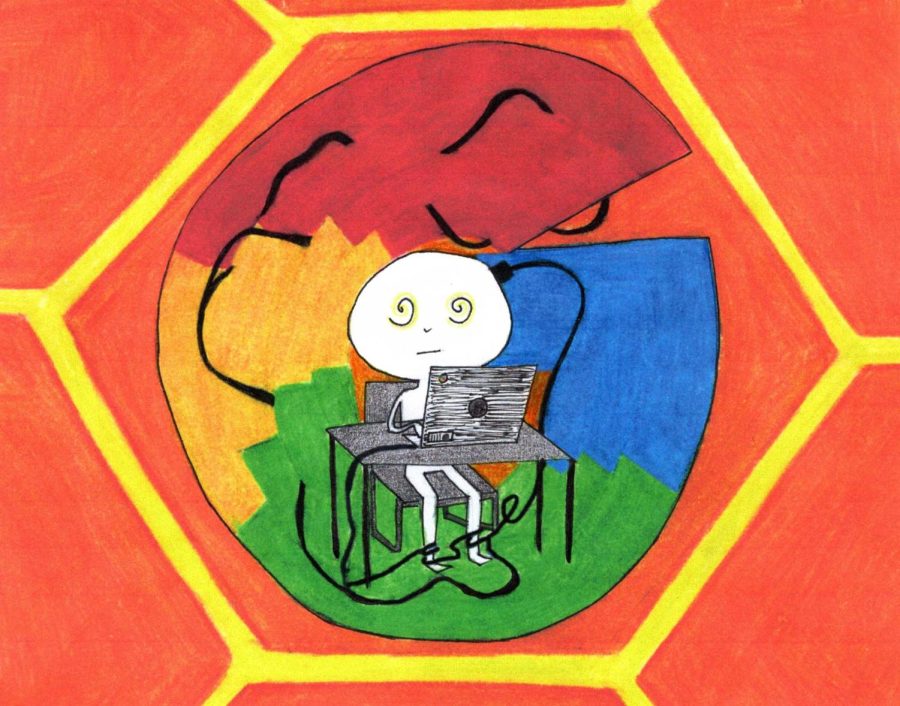OPINION: Hey, Google: School shouldn’t feel like an office job
OPINION

More stories from Isabella Russomanno
Illustration by Isabella Russomanno
OPINION
By Isabella Russomanno
The John Oliver Phenomenon
At the beginning of this school year, I noticed that I was still watching a number of instructional videos in class almost daily, which brought to mind the incoherent blur of Google Meets and asynchronous time that was 2020 and 2021. Soon after, I began tracking the number of minutes I was watching a video in every class for about a month.
I started seeing John Oliver, the leftie British comedian, someone I usually encounter independently of school, in some of my classes. This seemed odd. Why was John Oliver emphatically yelling at me about campaign finance laws? Why was John Oliver yelling at me about the mental health crisis in America? Inflation? Lobbying? What about the CrashCourse brothers? Heimler’s History? I thought the use of YouTube videos would have subsided by now.
I had other questions, too. Why was I still taking exams on my computer? Why was I still doing regular assignments on my computer? And why am I doing so many group projects on my computer?
This was my main misconception. I was expecting school to go back to the way it was. However, this computerized structure was the way it was always meant to be. We’ve finally arrived, but why does it feel like the bureaucratization of school rather than an enlightenment?
Miracle devices
In the fall of 2021, fresh out of remote learning, Lane’s student newspaper covered Lane’s achievement of its one-to-one device model in an article by former managing editor Theo Gary. Damir Ara, one of Lane’s assistant principals, expressed much optimism for the program, referencing the physical load that would be taken off of students’ backs.
“My ideal situation is that everyone here is just walking with the pretty thin tablet that they’re taking to their class,” Ara told The Warrior in 2021. “And that is their tool, and they don’t need anything else, because the curriculum, and anything involving instruction or assessment will be already online.”
Granted, I doubt that Lane administrators or even CPS had any evil intentions by wanting to give students access to Google technology. In fact, the language that is used around this issue is almost always positive. We are “finally catching up,” “providing,” “stepping into the future” — reaching something truly great. I don’t blame administrators for implementing a program that they were told would be life-changing for both themselves and their students.
According to a Google for Education blog post chronicling the CPS laptop rollout, using the Google Suite platform and Chromebooks would help teachers “push their teaching to some unimaginable new levels,” by being able to “seamlessly work with Google Workspace tools.”
This makes computers sound like miracle devices. Who knew Google Docs could have such astounding soul-seizing powers? How could students and families say no?
$308 Million
According to the New York Times, the national school technology market was projected to reach $21 billion in 2020, some estimates had it at $60 billion by 2018. The market’s current location in this projection is unclear, but the $308 million CPS has spent on computers alone since 2020 may provide some context about the amount of money that is fueling this initiative locally. According to WBEZ, the $308 million is “as much as [CPS’s vendors] got paid during the previous two decades combined.”
Of course there is money in all of this, but this isn’t all about vendors getting paid. This is about what is actually being paid for and what has resulted is a shift towards an instructional style that is increasingly … Zuckerbergian?
In 2017, the New York Times published its “Education Disrupted” series of articles that first examined how mega-technology companies, such as Google and Microsoft, have entered the sphere of public schools. Not only has this collaboration included more devices, but schools have also adopted a learner-facilitator student-teach dynamic that seems reflective of the Meta CEO’s educational vision.
“In public remarks and Facebook posts, Mr. Zuckerberg has described how it works. Students cluster together, working at laptops. They use software to select their own assignments, working at their own pace. And, should they struggle at teaching themselves, teachers are on hand to guide them,” the Times reported (see “Student, Teach Thyself” section).
Creepy coincidence?
No plan?
Still, despite the multi-hundred-million dollar investment, WBEZ and Chalkbeat have found that CPS lacks a district-wide plan for technology use in instruction, leaving some schools with unused computers in closets, while others have carried out more involved plans of action.
This discrepancy reveals that the potential for flexibility can quickly result in an atmosphere of excess and aimlessness.
As a result, I am focused on the cumulative daily experiences of students (clicking, scrolling, typing, submitting). Is being well-versed in efficient Google-searching and typing at speeds that previous generations couldn’t possibly imagine really what students need to be successful humans? I doubt it.
Additionally, the bureaucratic aspects of this system seem to have put people into a subliminal state of paranoia.
Will this video play? Did someone forget their computer? And, of course: Does someone have a charger? And when you realize someone does not have a charger, you’re basically screwed. Then, we all laugh together at how screwed we are just because the technology stopped working.
It’s the same pandemic-school-era embarrassment found in, “Ha. Sorry, guys. I’m having trouble sharing my screen today. Gosh darn this technology.”
We’re still laughing at how we’re tethered to this system.
Got any data?
Despite the perceived efficiency of videos and hybrid in-person instruction, there has been little evidence found to support that universal laptop programs and self-paced online tools actually improve academic performance.
A comprehensive study from Durham University found that there is little to no causal correlation between more technology and better academic performance. It also debunked the various myths that come with tech in schools, including the Everest Fallacy (‘We must use technology because it is there!’) and the self-explanatory ‘More is Better Fallacy.’
A study conducted at West Point Military Academy found that students who were prohibited from using an Internet-connected device during class scored higher on the final exam than those who were allowed to use Internet-connected devices.
In a different controlled trial done with college students, it was found that “in-class computer usage reduces academic performance by between 0.14 and 0.37 points on a four-point grade scale among undergraduate students.” It was also found that simply sitting next to a computer user negatively affected student performance.
Out of all of this, the causal correlation that can be found is in the negative physiological impacts of screen use. According to a recent study, poor regulation of stress, overstimulation, and a “drag on mental energy” are all a part of passive, prolonged exposure to screens.
On a personal level, whenever a teacher puts on a video it feels as though they are desperately scraping together whatever is left of our attention spans and slapping that against the projector screen, seeing if the class sticks.
While this statement might sound cynical, I’m not cynical about Lane’s capability to produce well-rounded, versatile students.
The 21st-century education that Lane seeks to provide does not need to be synonymous with using the most technology, especially in situations where it might be easier to just use paper (a choice which, I digress, wouldn’t make much sense for computer science and interactive STEM classes).
More Technology = Happy and Intelligent?
In any capacity, criticizing the technology that we have sounds ungrateful.
In response, I reject the halo radiating from the image of a supercharged Chromebook-tethered child.
The access-focused response to educational technology is largely the product of a corporate pitch that can be broken down into the following: More technology = happy and intelligent; Less technology = sad and underserved.
This provides the perfect opening for companies like Google to fill the gap and “save” urban districts like CPS with devices that are not concretely proven to be effective and are likely having a negative impact on users’ mental and physical health when integrated uncritically.
We need to question why we are giving our real time, energy, and money into using these devices every single day.
What should I believe when my head is foggy after a day of computer work and then having to do more computer work at home if I want to keep up? What should I think when class comes to a screeching halt when a video can’t be played or the WiFi connection is faulty?
Good intentions and all, the prescribed learning format of a post-remote CPS was never meant to “go back” to the way it was. It was always meant to be this way, and now Lane is living the future that the ed-tech conglomerates imagined.
I’ll end on this: think about a time when you enjoyed class. Was it when you were having a rowdy split-room debate on the ethics of giving an alibi to your homicidal child? Or was it when you filled out another table in a Google Doc for your daily “group project”? I think we both know the answer.
Needless to say, teaching is difficult. Motivating teenagers to meaningfully learn let alone pay attention is also difficult. But, courtesy of our reliance on these devices, it feels like the memorable, or at least non-redundant, moments that I take away from class need to be fought for instead of just experienced.
The solution for fewer tired students might quite literally be right in front of us. It’s up to us to decide whether we will integrate this technology into our lives more meaningfully or continue to be shackled to the inanity of our own creation.
Your donations directly fund the Lane Tech student journalism program—covering essential costs like website hosting and technology not supported by our school or district. Your generosity empowers our student reporters to investigate, write, and publish impactful stories that matter to our school community.
This website is more than a publishing platform—it's an archive, a research tool, and a source of truth. Every dollar helps us preserve and grow this resource so future students can learn from and build on the work being done today.
Thank you for supporting the next generation of journalists at Lane Tech College Prep!

Isabella is a senior Omega and this is her first year with The Champion. She is a member of Lane’s Stage Krew and is a Writing Center tutor. She loves...

